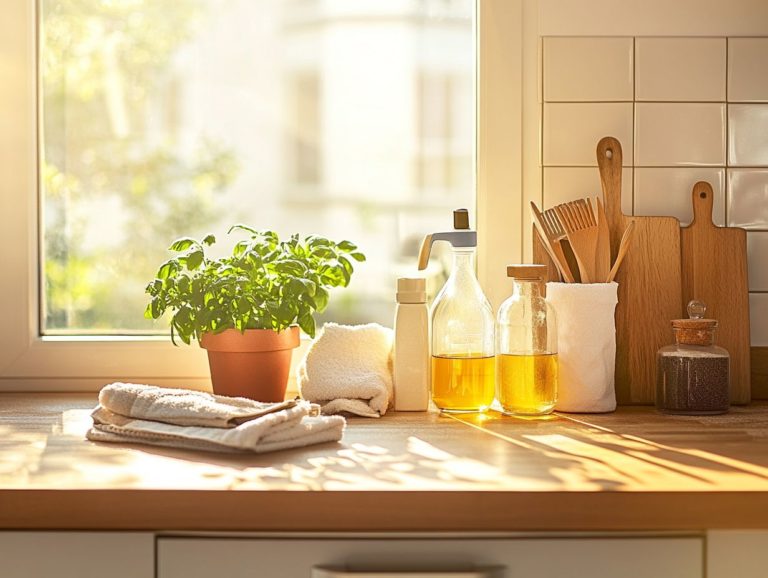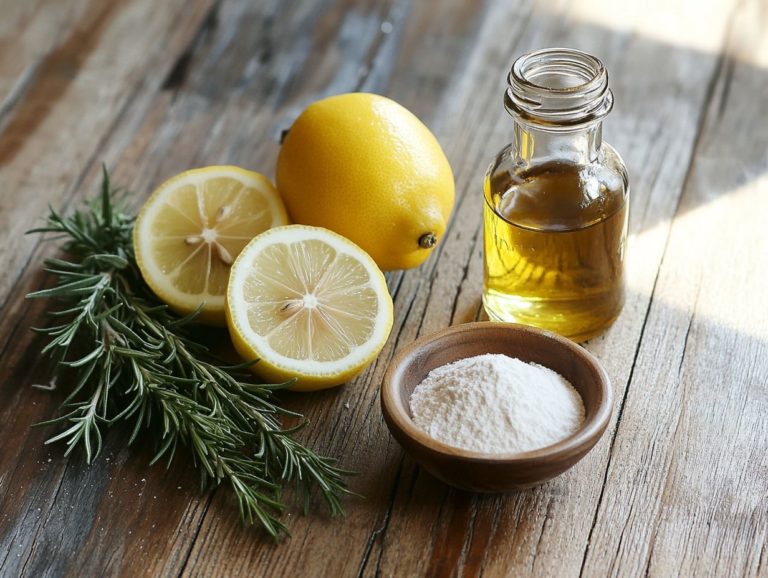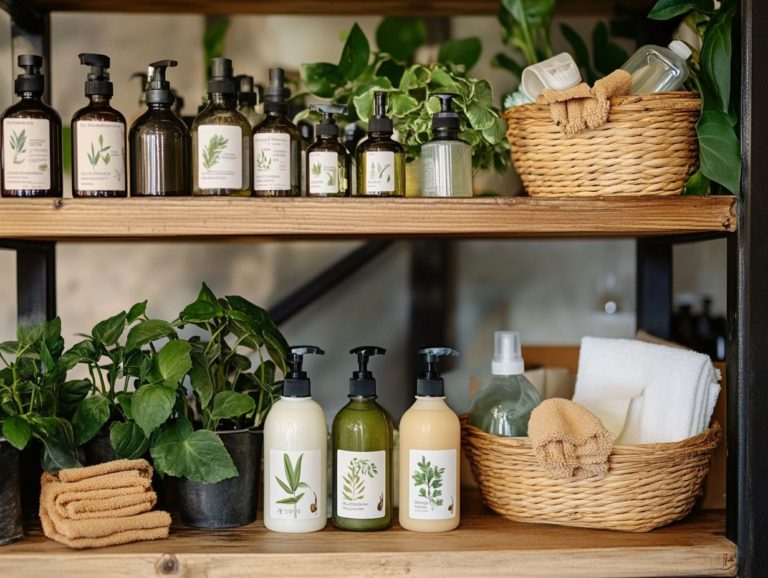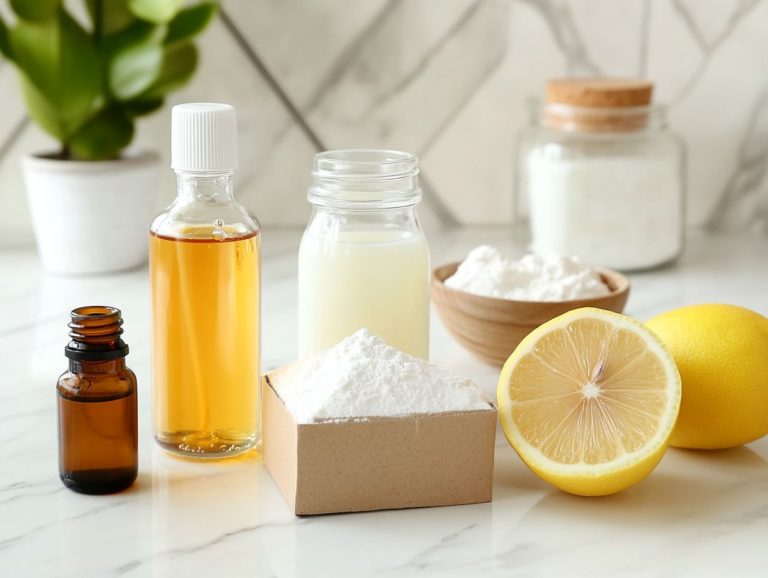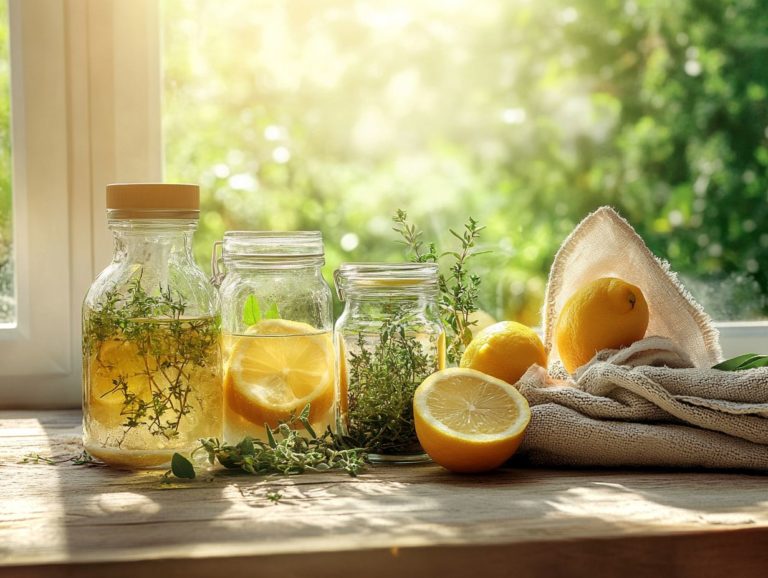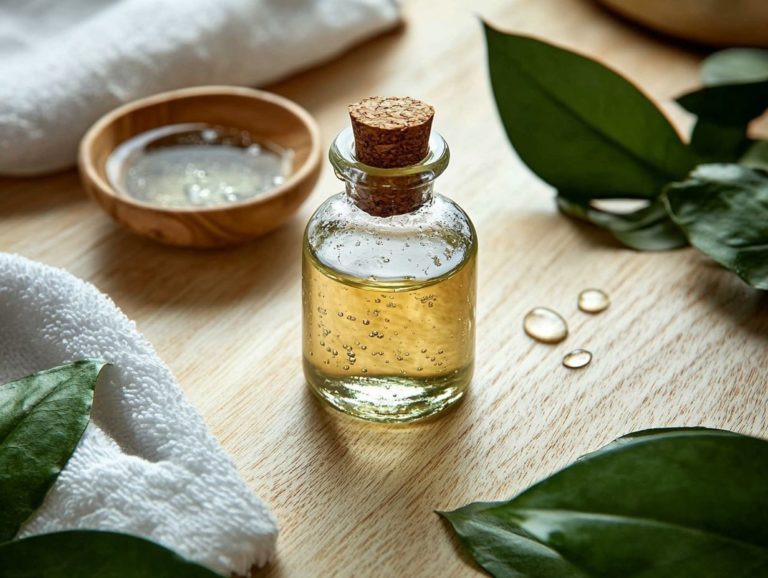Understanding the Role of Vinegar in Cleaning
Vinegar is a versatile liquid used in both cooking and cleaning. It is mainly made of acetic acid and water.
This natural cleaning agent has gained popularity. It is celebrated for its effectiveness and is a non-toxic alternative to commercial cleaners.
With a variety of types available, including distilled white vinegar and cleaning vinegar, it has established a reputation for its exceptional stain removal capabilities and its knack for leaving surfaces gleaming.
The acidity of vinegar makes it an outstanding odor neutralizer, adept at banishing even the most stubborn odors from your space. Use vinegar for effective surface cleaning.
Contents
- How is Vinegar Made?
- What Types of Vinegar are Used for Cleaning?
- Key Takeaways:
- What Makes Vinegar a Good Cleaning Agent?
- What Surfaces Can Vinegar Be Used to Clean?
- How Can Vinegar Be Used for Specific Cleaning Tasks?
- Vinegar Applications and Cleaning Tips in the Kitchen
- Vinegar as a Natural Cleaner and Laundry Aid
- Vinegar Cleaning Recipes and Guidelines
- Cleaning Hacks and Techniques Using Vinegar
- Final Thoughts and Recommendations
- Vinegar and Essential Oils: An Effective Cleaning Solution
- Vinegar vs. Commercial Cleaning Products
- Common Myths and Facts About Vinegar
- FAQs and Cleaning Guidelines About Vinegar as a Cleaning Agent
- Frequently Asked Questions
- How does vinegar help with cleaning?
- How does vinegar work as a cleaning agent?
- What surfaces can be cleaned with vinegar?
- Can vinegar be used as a replacement for store-bought cleaners?
- Are there any precautions to keep in mind when using vinegar for cleaning?
- Does the type of vinegar matter for cleaning purposes?
How is Vinegar Made?
Vinegar is crafted through a fascinating fermentation process. Here, the sugars from fruits or grains undergo a transformation into alcohol. This alcohol is then oxidized, culminating in the formation of acetic acid the key ingredient that gives vinegar its sour taste.
This intricate journey begins with the fermentation of sugars sourced from various ingredients, such as apples for cider vinegar or grains for distilled white vinegar. Initially, yeast works its magic, converting sugars into alcohol during the primary fermentation phase. After this, specific bacteria, known as Acetobacter, metabolize the alcohol and produce acetic acid. This vinegar acid is crucial for effective cleaning.
In distilled white vinegar, you ll find around 5-7% acetic acid, while cleaning vinegar packs a more powerful punch, with concentrations ranging from 6-20%. This potent acid not only contributes to vinegar’s distinct taste but also elevates it to the status of a formidable, natural cleaning agent, effectively battling tough grime and odors without resorting to the harsh chemicals often found in commercial cleaners.
What Types of Vinegar are Used for Cleaning?
In terms of cleaning, several types of vinegar truly stand out, each offering its own unique benefits. Among the most popular choices for eco-conscious individuals seeking effective solutions are cleaning vinegar, distilled white vinegar, and apple cider vinegar.
These versatile vinegars excel at tackling tough grime, stubborn stains, and lingering odors, making them critical allies in your household cleaning arsenal. Consider adding citrus peels to your cleaning vinegar for a fresher scent.
Cleaning vinegar shines with its higher acetic acid content, giving it an edge as a powerful cleaner. Meanwhile, distilled white vinegar serves as the go-to option for general-purpose cleaning tasks.
With these options at your disposal, you’re well-equipped to elevate your cleaning routine using effective cleaning techniques.
Key Takeaways:
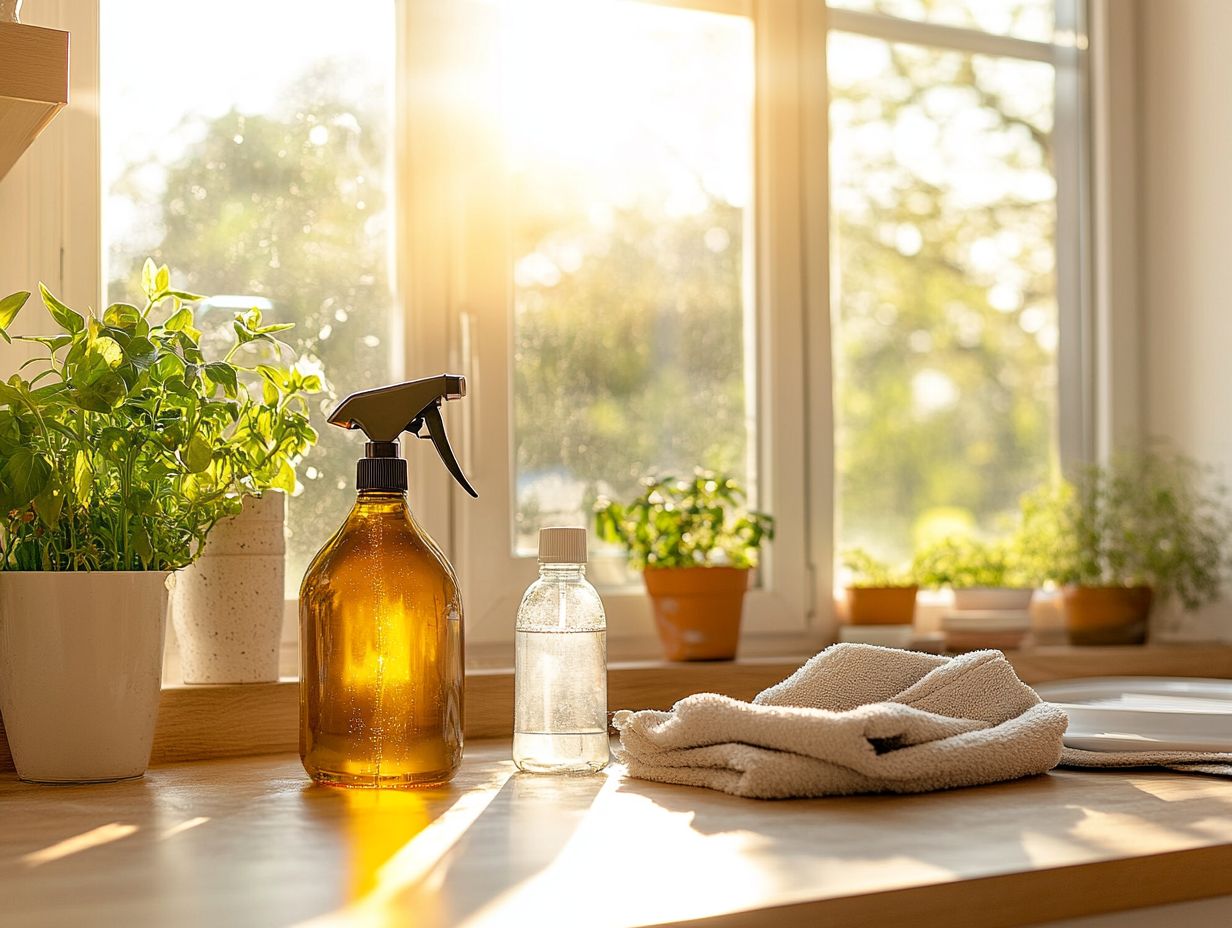
- Vinegar is a versatile and effective natural cleaning agent that is non-toxic and environmentally friendly.
- White distilled vinegar and apple cider vinegar are commonly used for cleaning, while cleaning vinegar is specifically formulated for household tasks.
- Vinegar’s acetic acid content and antibacterial properties make it great for cleaning various surfaces.
What Makes Vinegar a Good Cleaning Agent?
Vinegar stands out as an exceptional cleaning agent, thanks to its high acetic acid, the main ingredient in vinegar. This natural disinfectant effectively combats germs and bacteria on a variety of surfaces, making it an ideal choice for those who prioritize eco-friendly solutions and natural cleaning products.
As a discerning consumer, you ll appreciate vinegar as a non-toxic alternative to harsh commercial cleaning products. Its antibacterial properties not only boost its cleaning power but also ensure safety for children and pets, making it popular as a trusted, eco-friendly cleaner. Try using diluted vinegar for safe cleaning of delicate surfaces.
What Surfaces Can Vinegar Be Used to Clean?
Vinegar emerges as an exceptional cleaning agent, adept at tackling a myriad of surfaces. It has garnered a devoted following among homeowners and cleaning aficionados due to its unmatched cleaning efficiency.
You can confidently use it on countertops, floors, windows, appliances, and beyond. Its versatile nature enables it to combat stubborn grime and soap scum. It effectively deodorizes spaces, making vinegar a critical kitchen cleaner and household essential.
Explore various vinegar cleaning tips to maximize your cleaning results. Its gentle yet effective formulation helps clean delicate materials like marble, granite, and electronic screens, further amplifying its versatility in your cleaning endeavors. For wood surfaces, consider using a vinegar and water solution.
How Can Vinegar Be Used for Specific Cleaning Tasks?
Vinegar serves as a versatile ally in your cleaning endeavors, effortlessly tackling specific tasks such as stain removal, odor neutralization, and even unclogging drains. This remarkable substance is an essential addition to your cleaning toolkit. Utilize simple vinegar cleaning recipes for optimal cleaning effectiveness.
Its prowess in combating soap scum in both bathrooms and kitchens is particularly noteworthy. Its inherent ability to neutralize unpleasant odors makes it perfect for refreshing a variety of surfaces. Don t miss out on making vinegar your go-to for all household cleaning tasks!
By utilizing straightforward vinegar cleaning recipes and techniques, you can fully harness the advantages of this natural cleaning agent. Elevate your daily cleaning routine to new heights. Discover various homemade cleaner recipes to maximize your cleaning efficiency.
1. Removing Stains and Odors
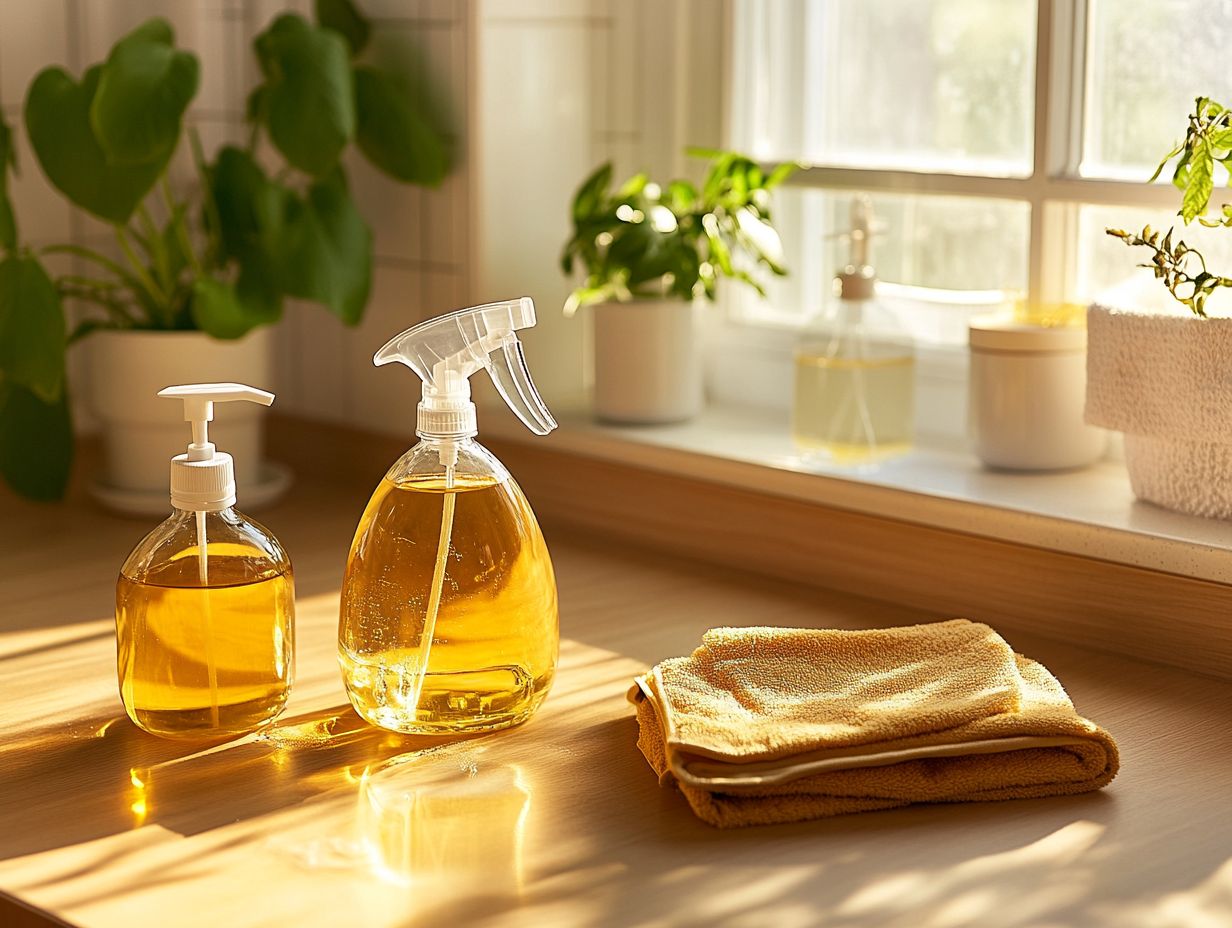
Removing stains and odors with vinegar is not just simple; it s a remarkably effective strategy. Its acidic nature works tirelessly to break down stubborn stains while neutralizing unpleasant smells. Whether you re dealing with a food stain on your favorite fabric or persistent odors lurking in your carpets, vinegar becomes your powerful ally in the cleaning process.
For instance, if you mix equal parts vinegar and water, you create an excellent pre-treatment for greasy kitchen stains. To tackle pet odors, a combination of vinegar and baking soda can work wonders. Just sprinkle some baking soda on the affected area, spray it with vinegar, and watch it fizz before you vacuum it all away. This vinegar cleaner works wonders on various surfaces.
If you want to elevate the experience further, consider adding a few drops of essential oils to your vinegar solution. This not only masks the vinegar odor but also leaves behind a refreshing fragrance. This versatile ingredient is both economical and eco-friendly, making it a top choice for anyone seeking natural alternatives in their cleaning arsenal.
Are you ready to transform your cleaning routine with vinegar? Give vinegar a try today and see the difference it makes in your home!
2. Unclogging Drains
Unclogging your drains can be easy with a simple mix of vinegar and baking soda. This strong mix is a powerful cleaning solution that dissolves buildup and clears blockages. It is eco-friendly and helps keep your plumbing system clean and odor-free.
First, gather your ingredients:
- Half a cup of baking soda
- Half a cup of vinegar
Pour the baking soda directly into the clogged drain, then follow it with the vinegar. You ll see a delightful fizzing reaction that works wonders on grease and debris.
Let this strong mix sit for at least 30 minutes to unleash its unclogging potential. If you can wait an hour, you’ll likely get even better results. When the time is up, simply flush the drain with hot water to rinse away any leftover residues. This natural cleaner ensures effective results.
This straightforward cleaning hack helps create a healthier home environment and cuts down on toxic chemicals. It’s perfect for those who care about the environment.
3. Removing Soap Scum
Removing soap scum from surfaces like your bathtub and sink is a breeze with vinegar. Thanks to its acidic properties, vinegar easily dissolves mineral buildup and soap residues. This simple vinegar mixture can elevate your cleaning routine, making it both efficient and effective.
To harness the full power of vinegar, consider mixing it with baking soda for a stronger cleaning solution. This powerful duo tackles stubborn stains and leaves your surfaces sparkling clean.
For a simple recipe, mix equal parts of vinegar and water in a spray bottle. If you’re dealing with stubborn soap scum, create a paste using vinegar and baking soda. Apply it directly to the affected areas and let it sit for about 15-20 minutes before scrubbing. Rinse thoroughly afterward.
This method works wonders on ceramic tiles, glass shower doors, and even acrylic tub surfaces. Just remember to test a small area first to ensure it’s compatible. For cleaning floors, diluted vinegar works best!
4. Cleaning and Deodorizing Garbage Disposals
Cleaning and deodorizing your garbage disposal is simple with vinegar. It acts as a powerful odor neutralizer and helps break down food particles. By using this method, your disposal will stay fresh and functional.
Incorporating vinegar into your cleaning routine helps tackle stubborn odors while keeping the blades sharp and efficient. Start by pouring a cup of distilled white vinegar directly into the disposal and let it sit for about 30 minutes. This step neutralizes odors and dissolves any lingering grime.
For an extra freshness boost, mix the vinegar with a handful of baking soda. This natural duo will fizz and provide an abrasive action that cleans the inner workings of your disposal. After the waiting period, flush the disposal with hot water to rinse away the residue, leaving it clean and invigoratingly fresh.
Regular maintenance, like running cold water and disposing of food scraps promptly, enhances the lifespan and functionality of your disposal. Using a vinegar cleaner can further improve cleaning results and efficiently remove odors.
5. Removing Rust, Soap Scum, and Mineral Deposits
Vinegar is your ultimate non-toxic cleaning hero! This effective cleaner tackles rust, soap scum, and mineral deposits thanks to its acetic acid, which dissolves corrosion and buildup on various surfaces. It s the go-to choice for restoring items without harmful chemicals.
When using vinegar, selecting the right type is crucial. White vinegar or distilled white vinegar is typically the best choice for cleaning due to its higher acidity level. To combat rust, immerse the affected item in vinegar for several hours or overnight. This simple step can yield remarkable results! For an extra boost, a gentle scrub with a brush can speed up the process.
For mineral deposits, spray vinegar directly onto the surface and let it sit for about 30 minutes to break down that stubborn buildup. For tough grime, mix vinegar with baking soda for added effectiveness. Remember, safety is essential wear gloves to protect your skin from irritation, and ensure proper ventilation to enhance your comfort while using this powerful yet gentle solution.
Vinegar Applications and Cleaning Tips in the Kitchen
Vinegar offers a remarkable array of applications in your kitchen. It functions not only as an effective cleaning agent but also as a vital enhancer of food safety and hygiene. Its acetic acid content makes it a potent cleaning agent and odor neutralizer, perfect for maintaining kitchen cleanliness.
Its natural cleaning properties make it an excellent option for disinfecting surfaces and effortlessly removing food residues. Use a microfiber cloth for the best cleaning results and to freshen the air around you.
Vinegar as a Natural Cleaner and Laundry Aid
Utilizing vinegar as a laundry aid is a favored approach for those who appreciate eco-friendly cleaning solutions. It boosts the effectiveness of your laundry detergents, serves as a natural fabric softener, and helps remove tough grime from fabrics.
Laundry vinegar is excellent for removing stains, neutralizing odors, and keeping fabrics vibrant.
Vinegar Cleaning Recipes and Guidelines
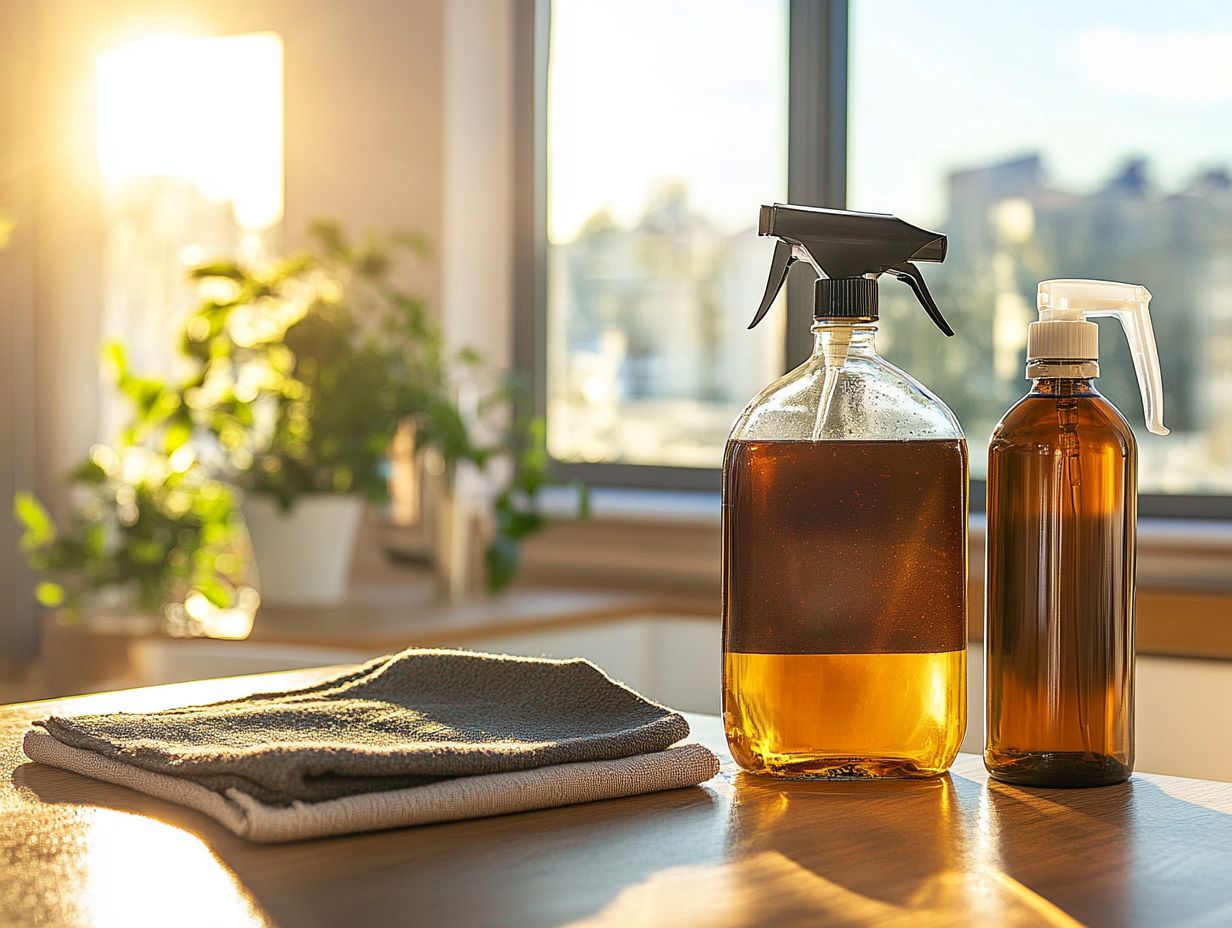
By crafting effective cleaning recipes with vinegar, you can harness its remarkable cleaning properties while reducing your reliance on harsh chemicals. These cleaning guidelines will help you create powerful homemade cleaners for various household tasks.
These homemade cleaners are perfect for tackling specific cleaning challenges around your home. You can create different vinegar mixtures, each tailored to enhance your cleaning efficiency. Adding essential oils can improve the fragrance and disinfectant properties of your vinegar cleaner.
Cleaning Hacks and Techniques Using Vinegar
Cleaning hacks that utilize vinegar can elevate your household cleaning routine, making it simpler and more efficient. This eco-friendly cleaner is not only versatile but also budget-friendly. Using citrus peels in your vinegar solution can enhance its odor removal capability.
By incorporating a variety of vinegar applications, you can effectively tackle multiple cleaning challenges with ease. Try out these vinegar hacks today and transform your cleaning routine!
Conclusion: Embrace the power of vinegar in your cleaning routine! With its versatility and eco-friendliness, you can tackle tough stains and maintain a clean environment without resorting to harsh chemicals. Start using these tips today and enjoy a fresher, cleaner home!
Final Thoughts and Recommendations
Incorporating vinegar into your cleaning routine is a straightforward yet powerful way to enhance the cleanliness of your home. It serves as a safe cleaning solution that can effortlessly tackle a wide range of tasks, from surface cleaning to stain removal.
This versatile solution cuts through grease and eliminates stubborn stains, making it an essential component of your cleaning toolkit. If you’re aiming to adopt greener habits, vinegar presents a budget-friendly alternative to conventional cleaning products, all without the harsh chemicals.
Start using it to clean your windows, freshen up your laundry, or deodorize your carpets, and get ready to transform your cleaning routine! Vinegar’s disinfectant properties further enhance its appeal as a household cleaning staple.
Consider mixing vinegar with baking soda for an extra punch against tough grime. As you explore the myriad uses of this natural cleaner, you’ll realize that it not only enhances your home environment but also contributes positively to the planet. This creates a cleaner, healthier space for you and your family.
Always remember to dilute vinegar with water. This ensures safe cleaning on delicate surfaces.
Vinegar and Essential Oils: An Effective Cleaning Solution
By combining vinegar with essential oils, you can elevate your cleaning experience, enhancing both its effectiveness and delightful fragrance. This blend transforms vinegar into a more pleasant and aromatic natural cleaning agent that refreshes your space and invigorates your senses.
Citrus-infused vinegar is especially popular for its fresh scent. Essential oils also add antibacterial properties, ensuring that your cleaning process is efficient and contributes to a healthier environment.
This combination makes for an excellent all-purpose cleaner.
Vinegar vs. Commercial Cleaning Products
When you compare vinegar to commercial cleaning products, it becomes clear that vinegar stands out as the superior choice, especially if you care about the environment and your health. Its eco-friendly nature and non-toxic composition make it a compelling alternative.
Vinegar proves to be quite effective in tackling a variety of cleaning tasks, offering you an efficient and budget-friendly solution.
Common Myths and Facts About Vinegar
Despite its widespread popularity, numerous myths surrounding vinegar and its cleaning capabilities continue to circulate. Many individuals underestimate its effectiveness or mistakenly believe it could damage certain surfaces.
Understanding vinegar’s properties will help you use it more effectively and safely. By grasping the facts about vinegar, you can enhance your household cleaning routines and utilize this powerhouse ingredient to its fullest potential.
For instance, diluted vinegar is safe for most cleaning tasks and helps prevent stains on surfaces.
FAQs and Cleaning Guidelines About Vinegar as a Cleaning Agent
When it comes to vinegar as a cleaning agent, you ll often encounter a range of frequently asked questions that touch on its effectiveness, safety, and best practices for its use. These inquiries underscore a rising interest in vinegar as a natural alternative to conventional cleaning products.
Adhering to cleaning guidelines ensures you get the best results while maintaining safety.
Frequently Asked Questions
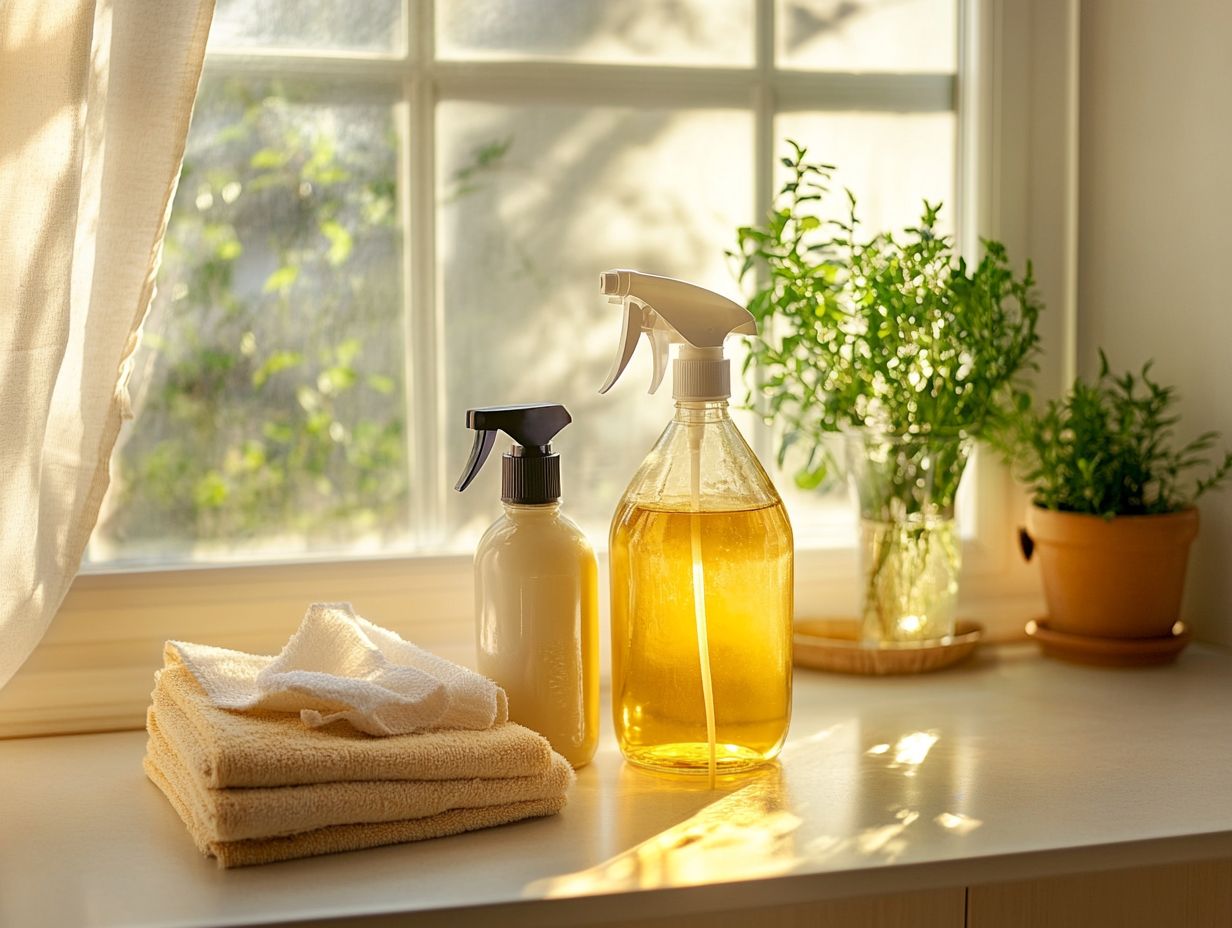
How does vinegar help with cleaning?
Vinegar is a natural and versatile cleaning agent that can effectively remove dirt, grime, and bacteria from various surfaces. Its acidic nature helps break down and dissolve tough stains, making it a popular choice for household cleaning. This natural cleaner is particularly effective when used as a multi-purpose cleaner.
How does vinegar work as a cleaning agent?
When vinegar is applied to a surface, its acidic properties break down the chemical bonds of dirt and grime, making it easier to wipe away. Its antibacterial properties also make it an effective disinfectant, killing germs and bacteria on surfaces. For cleaning floors, a vinegar and water solution is often recommended.
What surfaces can be cleaned with vinegar?
Discover how vinegar can effectively clean your entire home! You can use it on countertops, floors, glass, tiles, and even some fabrics.
However, be cautious! Avoid using vinegar on marble or granite because it can cause damage. It s also wise to skip vinegar for electronic screens and wood surfaces to prevent harm.
Can vinegar be used as a replacement for store-bought cleaners?
Yes! Vinegar is a natural and cost-effective alternative to many store-bought cleaners. It’s good for the planet and safe for homes with children and pets.
Its cleaning power rivals that of many conventional solutions, making it a fantastic choice.
Are there any precautions to keep in mind when using vinegar for cleaning?
Yes, vinegar can be harmful if ingested or if it contacts your eyes or skin. Always wear gloves and eye protection when cleaning with it.
Mix vinegar with water before using it on surfaces to make it safer and prevent irritation.
Does the type of vinegar matter for cleaning purposes?
Absolutely! White vinegar, or distilled vinegar, is the best option for cleaning due to its high acidity and colorlessness, which helps prevent stains.
Apple cider vinegar and other varieties can also clean, but distilled white vinegar is generally preferred for its superior effectiveness.

